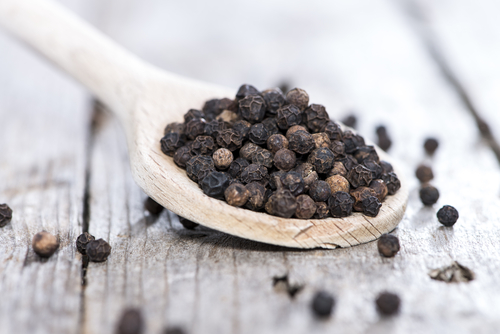10 Healing spices to include in your diet!
mis à jour le 24 July 2017 à 12:11
These traditional Indian spices have been used for centuries, but which are the most beneficial for our health and well-being? Ayurvedic Specialist Indrajit Garai shares with us her selection.
The digestive properties of black pepper:
Commonly used as seasoning in the West, black pepper is also listed as a remedy in Sanskrit medical texts. As a brew (4-5 grains per cup), combined with half a teaspoon of dry ginger, it becomes an effective diaphoretic tea to nip the start of a cold in the bud. “To preserve its qualities, use them in grain form, or, failing which, as a not-too-finely-ground powder,” recommends William Witrant, manager at Masalchi, a French-based company that offers quality organic spices.
Saffron against menstruation pains:
The most expensive of spices, (in 1 kilo of dry saffron, there are the pistils of 200,000 flowers), with its slightly bitter scent, it possesses both sedative and calming virtues, which help relieve menstrual cramps and hypertension. For a brew, infuse six stigmata per cup, add water, milk or hot green tea - do not boil - and allow it to seep (ideally for four hours).
The cinnamon treatment for food poisoning:
In the Top 10 on the list of most antioxidant substances. A relative characteristic, as we have to take into account the fact that we generally consume it in mini-doses. With its antibacterial properties, it is effective in brew form against mild food poisoning. Antiviral, it can also be added to a hot toddy to stop a budding cold.
The anti-inflammatory turmeric:
From the same botanical family as ginger, its deep orange pulp gives colour to curries. This is the star of research on therapeutic spices. With its powerful anti-inflammatory properties, it also works on the liver and gall bladder. We recommend pairing it with pepper, to facilitate its assimilation. To be avoided in cases of osteoporosis.
The stomach-cleansing anise:
It promotes secretions (saliva, gastric and bronchial) and aids digestion. Its seeds can be prepared in a brew, swallowed as grains, sprinkled over a salad, or even mixed into your daily coffee. Avoid during pregnancy and in cases of hypertension.
The intestine-calming coriander:
The coriander seeds give off a slightly spicy and earthy perfume, very different from the scent of its leaves. “It fights against flatulence, calms irritated intestines, and has seemingly no negative side effects,” said Indrajit Garai. Here is her recipe for a balancing spice mix: 2 portions of ground coriander seeds, 1 portion of powdered turmeric, and 1 of ground fenugreek, prepared in advance and stored away from light and heat. This blend can be put on green salads.
The toothache-relieving clove:
Rich in eugenol (the famous "dentist smell"), an antibacterial and sedative molecule, it soothes toothaches. We can thus chew a slightly preheated clove for this purpose. It also has anti-nausea properties (to be consumed as an infusion, with two or three cloves per cup).
Cumin, good for the small intestine:
Its small, strong-smelling seeds, often associated with Mediterranean cuisine, are also present in spice mixes and Ayurvedic therapeutic mixtures. “Its primary target: the small intestine,” says Indrajit Garai. “If the stomach growls two hours after a meal, take some cumin. In the case of flatulence, three or four hours later, opt for coriander.” In Ayurvedic medicine, spices are preferably consumed raw.
Ginger treats motion sickness:
It aids digestion, stimulates the circulatory system, reduces the effects of jetlag, and is an effective remedy against nausea. (Seek medical advice in the case of gallstones or pregnancy.) A salad recipe by Indrajit Garai herself: finely slice a cube of fresh ginger over 300g of grated carrots seasoned with a tablespoon of olive oil and a teaspoon of mustard. Add a tablespoon of roasted seeds, (coriander, cumin, etc.) dried raisins, sunflower seeds and pine nuts. All ready!
The fortifying cardamom:
“This is a hot spice, suitable for smokers and people under stress,” says Indrajit Garai, who recommends chewing one to two seeds per day to strengthen the spleen and stomach. Green cardamom (with a lighter scent than its black counterpart) should be bought in organic form if possible, because this fragile subtropical plant is often chemically treated.
By Martine Azoulai



